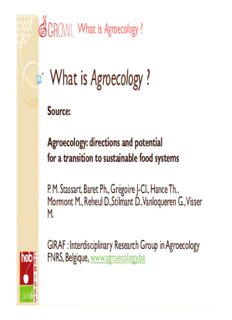
What is Agroecology PDF
Preview What is Agroecology
What is Agroecology ? What is Agroecology ? Source: Agroecology: directions and potential for a transition to sustainable food systems P. M. Stassart, Baret Ph., Grégoire J-Cl., Hance Th., Mormont M., Reheul D.,Stilmant D., Vanloqueren G., Visser M. GIRAF : Interdisciplinary Research Group in Agroecology FNRS, Belgique, www.agroecology.be What is Agroecology ? What is Agroecology ? Definitions Objectives History Principles How can we Evolution Historical principles feed the world? /complexificatio Methodological principles n of the definition What is Agroecology ? How can we feed the world ? FAO(2011) The state of food insecurity in the world: - 850 million people on earth suffer from hunger ½ are small farmers or farm workers living in rural areas - many others suffer from the erosion of their revenue and autonomy (cid:1) Food crisis Millennium Ecosystem Assessment (MEA, 2005): agriculture use 70 % of the water extracted for human needs - the global agricultural food system is the main source of soil, forest, - fish stocks, and water degradation. 2/3 of the worldwide ecosystem services are degraded or - unsustainably managed (drinking water, pollination, decomposition of waste, wild food, …) (cid:1) Environmental crisis What is Agroecology ? How can we feed the world ? Buttel (1995)Twentieth CenturyAgricultural-EnvironmentalTransitions: Two possible ways to fight against food & environmental crisis (+ climate crisis + energy crisis) Agroecology Biotechnology based on socio-environmental based on biotechnologies to capacity to re-naturalise the increase the food production and to food systems by insure the needs, quality and sanitary increasing/strengthen security of the global markets employment Sufficiency-oriented way Productivity-oriented way The way we look at problems and solutions differs fundamentally between productivity-oriented and sufficiency-oriented thinking. What is Agroecology ? How can we feed the world ? Fundamental presupposition of agroecology : Agroecology is a new way to ensure a productivity that meets the growing demands of the global market. Agroecology is a new way to organise the food systems to face the diversity and the multiplicity of food issues and objectives, while taking into account the environmental and social dimensions ! Agroecology focuses foremost on the search for autonomy and on the parsimonious and sustainable use of resources. What is Agroecology ? Historical definitions of Agroecology (cid:1) 1st time : integration of ecology to agronomy good practices Altieri (1983) The question of small farm development: Who teaches whom? = application of ecological principles to agriculture = production of knowledge and practices to make agriculture more sustainable = working at the level of the whole productive agro-ecosystem (farming system) and not only at the level of a single field/crop (cid:1) The definition is restricted to food production « Agroecology is the application of ecology for the study, the development and the management of sustainable agro-ecosystems » (Gliessman 1998) What is Agroecology ? Agriculture as an ecosystem What is Agroecology ? Historical definitions of Agroecology 2nd time: contribution of social sciences Altieri (1983a), «Agroecology, the scientific basis of alternative agriculture » Adding, to the production-dimension, the spinneret and consumption management, and the socioeconomic and political dimensions (cid:1) The definition is enlarged to the whole food system Agroecology is the application of ecology to the study, the design and the management of the food systems. By definition, it is an interdisciplinary practice that needs a redefinition of scientific and social limits, which is a major intellectual challenge for agricultural research (Buttel 2003) in ecology and social sciences. It requires the construction of new knowledge and it questions the way scientists (working on agricultural and food systems) are trained. What is Agroecology ? Historical definitions of Agroecology 3rd time: taking into account the relations between sciences and society What are the point of view of the associations, citizens, consumers, social actors and practicing people ? (cid:1) The definition is enlarged to the whole society Agroecology is not exclusively defined by practices, or by sciences, neither by social movements (Wezel, Bellon et al. 2009). It is expected to become a federating concept through actions that are in between these three dimensions. What is Agroecology ? Principles of Agroecology The 5 historical principles Reijintjes, Haverkott et al., 1992 1° biomass recycling as natural source of nutrients 2° improving structural and biotic soil conditions: zero-tillage, reduction of chemical fertilisers and pesticides 3° promoting use of sustainable resources (solar, organic, hydric) and reducing oil use 4° promoting genetic biodiversity within time and space 5° promoting favourable biological interactions and synergies (ecological services)
Description: